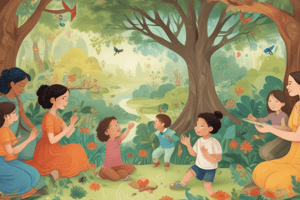Podcast
Questions and Answers
What is the definition of a family according to the U.S. Census Bureau?
What is the definition of a family according to the U.S. Census Bureau?
- A group of people who share the same cultural background and beliefs
- A group of people who work together in the same profession
- A group of people who live together and are either biologically related, married, or adoptively connected (correct)
- A group of people who attend the same educational institution
Besides parents, who else might be considered part of a child's family according to the National Association for the Education of Young Children (NAEYC)?
Besides parents, who else might be considered part of a child's family according to the National Association for the Education of Young Children (NAEYC)?
- Teachers
- Neighbors (correct)
- Classmates
- Strangers
What role do families play in young children's lives?
What role do families play in young children's lives?
- Providing emotional, physical, and intellectual stimulation that has no impact on development
- Remaining distant and uninvolved in the child's upbringing
- Acting as obstacles to a child's cognitive, social, and emotional development
- Shaping the lives of young children through emotional, physical, and intellectual support (correct)
Why is it important for educators to understand and accept diversity in families?
Why is it important for educators to understand and accept diversity in families?
How do families contribute to the development of young children?
How do families contribute to the development of young children?
Why is it crucial for professionals working with families to acknowledge the uniqueness of each family?
Why is it crucial for professionals working with families to acknowledge the uniqueness of each family?
What is the primary emphasis of family-centered practice in early childhood education?
What is the primary emphasis of family-centered practice in early childhood education?
What is the aim of family life education programs?
What is the aim of family life education programs?
How does family-centered practice contribute to early childhood education?
How does family-centered practice contribute to early childhood education?
What is the significance of embracing diverse backgrounds and characteristics in early childhood education?
What is the significance of embracing diverse backgrounds and characteristics in early childhood education?
Why is it essential to support and enhance family relationships in early childhood education?
Why is it essential to support and enhance family relationships in early childhood education?
What is the main goal of comprehensive family life education programs?
What is the main goal of comprehensive family life education programs?
Flashcards are hidden until you start studying
Study Notes
Families: Key Players in Early Childhood Development and Well-Being
Definition of Family
A family is defined as a group of two or more people who live together and are either biologically related, married, or adoptively connected. The U.S. Census Bureau considers a family as such a group of people "related by blood, marriage, or adoption and residing together," while the National Association for the Education of Young Children (NAEYC) extends the definition to include adults "besides parents" who are involved in educating, nurturing, and advocating for the child.
Importance of Families in Early Childhood Education
Families play a crucial role in shaping the lives of young children. Their influence extends beyond biological ties to include extended family members, neighbors, best friends, and other caring adults who contribute to the child's upbringing. Families are central to young children's lives, providing emotional, physical, and intellectual stimulation that lays the foundation for their cognitive, social, and emotional development.
Diversity in Families
Each family is unique, reflecting varying cultural backgrounds, beliefs, and practices. Understanding and accepting this diversity is essential for educators and professionals working with families. Different cultures have distinct views of family and community, expectations of children, roles of parents and children, and values placed on education. Embracing these differences allows for a more inclusive and culturally responsive approach in early childhood education.
Family-Centered Practice in Early Childhood Education
Family-centered practice emphasizes the belief that families are the primary decision-makers in a child's life, recognizing their uniqueness and supporting their strengths and characteristics. It involves respecting and enhancing family relationships while being aware of the interactions and supports within families that may positively or negatively affect their involvement. This approach fosters a collaborative learning environment that values the family's role in the child's overall well-being and development.
Family Life Education Programs
Family life education programs aim to prepare individuals and families for their roles and responsibilities within family dynamics. These programs cover various topics, including understanding marital and family patterns, acquiring interpersonal skills for present and future family roles, and building strengths in individuals and families. By empowering families with knowledge and skills, these programs strive to promote healthy family functioning and prevent potential problems.
In conclusion, families serve as the foundation for early childhood development and well-being. Their diverse backgrounds and unique characteristics demand an inclusive approach to early childhood education. Embracing family-centered practice and implementing comprehensive family life education programs can help foster a supportive environment that acknowledges the vital role families play in shaping young children's lives.
Studying That Suits You
Use AI to generate personalized quizzes and flashcards to suit your learning preferences.




